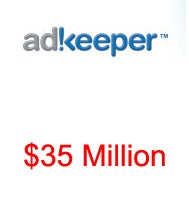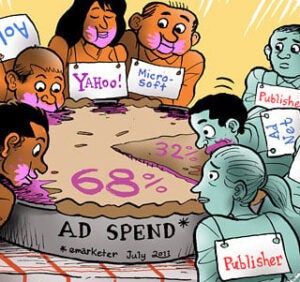 Here’s today’s AdExchanger.com news round-up… Want it by email? Sign-up here.
Here’s today’s AdExchanger.com news round-up… Want it by email? Sign-up here.
AdKeeper Gets $35 Million
Oak Investment Partners has led a new round of funding in advertising collector tech firm AdKeeper. PaidContent’s David Kaplan talks to AdKeeper CEO Scott Kurnit and says, “In terms of marketing it to consumers, AdKeeper does have one small advantage – in addition to the $43 million in capital [raised to-date] – compared to most of the other ad startups. ‘This is the ultimate opt-in system,’ Kurnit said, noting the current anxiety the online ad business is in over increasing regulatory pressure regarding behavioral targeting.” Read more.
Display’s 2011 Story Mostly About Google
(from 12/22) With Google on tap to seize $2.5 billion in display ad dollars in 2010, the search giant is now a display giant but they’re not the only game in town as ClickZ’s Zach Rodgers talks to Matt Freeman, CEO of IPG’s Mediabrands. Freeman tells Rodgers that the number of individual display providers is still increasing and adds that Mediabrands’ Cadreon trading desk works with roughly 100 partner companies. Read more.
Fearing The DMP
Sonal Patel writes on her Adsolver blog about the dilution of publisher power as various intermediaries step in: “Publishers are fearing the dawn of the Data Enablers (some call them DMPs – data management platforms) because most publishers have been sitting on their own data for some time and not thinking about its core value. In an age where data segments are now trading between advertising value chain players – they should be in fear because a publishers own data is extremely valuable – only when used.” Read it.
Google Goes Local
As it seeks to expand upon its display business, Google, like every other major online ad company, is looking to get more out of the local market. The company has hired several hundred local ad sales reps to attract new customers, the WSJ notes. Despite its seeming ubiquity with small marketers, AdWords never really took off for the truly small businesses, even though 20 percent of all Google searches is an attempt to find something local. The reason is that many of the businesses, who tend to be a bit unsophisticated in the ways of online, regarded the system as too complex and time-consuming. Hence the addition of local feet on the ground.
Mobile Privacy Plan
Mobile hasn’t been hit much by the current “Do Not Track” focus gripping the online ad industry. But as the story about Apple’s lawsuit fight below shows, the $600 million mobile marketplace is surely next and the Mobile Marketing Association hopes to head off any major regulatory actions that could hamper its growth. Mediaweek’s Katy Bachman says that MMA plans to introduce a series of mobile privacy guidelines this year.
AdExchanger Daily
Get our editors’ roundup delivered to your inbox every weekday.
Daily Roundup
Lawsuit Targets Apple
Apple was hit with a class action lawsuit that accuses the company and several prominent app makers of sharing users’ personal identification without permission or notification. A number of app makers were named in the suit as well, which was filed in federal court in San Jose, CA., just before Christmas, including Pandora, the Weather Channel and Dictionary.com. The suit, which has not been granted class action status yet, involves the Unique Device Identifier, or UDID, on Apple’s iPhones and iPads. Read more.
Interclick Blamed, But Not Sued
Speaking of class action suits and targeted ads, a federal case accuses McDonald’s, CBS, Mazda and Microsoft of use their online ads for surreptitious purposes. The class action suit filed in New York claims these companies have used advertising as a cover for data-mining and inserting malware. Although not named as a defendant, the suit says all of the aforementioned companies worked with ad network Interclick, which is described as a facilitator of this alleged bad behavior. Read more.
Demand Delayed
Content aggregator Demand Media’s IPO is likely to be delayed some more, AllThingsD’s Kara Swisher noted. The main obstacle at this point, aside from the less than confident assurances about its ability to reach profitability through ad sales. This time out, the holdup is related to how it expenses the costs of generating its content. Read more here.
Publishers, Not Privacy
Think the current debate is all about consumers’ privacy worries? Not a chance, says Ben Kunz is director of strategic planning at Mediassociates, a media planning and internet strategy firm, who argues in a Bloomberg BusinessWeek item that it’s the big publishers who are pushing the “Do Not Track” button. The reason is that targeted ads are cheaper and will more fully allow advertisers to buy audiences, not content brands. Sounds a little paranoid, but Kunz adds up the ad dollars to show why large publishers might be cheering the FTC’s proposal to allow users to opt-out of targeted ads through their browsers. Read more.
CAPTCHA-ing Video
“CAPTCHA” ad network and technology company Solve Media is adding video as an option in its ads to boost engagement further. Microsoft and Universal Pictures have signed on to use the new 15-second video format. Solve CEO and co-founder Ari Jacoby tells Mediapost’s Mark Walsh that message recall with the Type-In ad is 12 times higher than typical banners — a rate of about 40 percent compared to 3 percent, he claims.
Attribution Challenge
Proper attribution of the effects of marketing spend on ROI across marketing channels remains a challenge. Nevertheless, Motown Labs blogger Brian Tomasette has some ideas about finding ways of assessing the “incremental conversion boost you get (or don’t get)” and how advertisers can adjust their bids to pay for the most effective placements. Read it.
Tremor Paid $65M For Scanscout
Video ad network Tremor Media paid at least $65 million for ad placement service Scanscout back in November, Techcrunch’s Robin Wauters found, citing an SEC filing. A Tremor representative said that the amount was “mostly in stock” and that it was reinvested in the company. As Tremor’s CEO Jason Glickman told AdExchanger at the time of the purchase, the deal was designed to help the company achieve greater scale.
Ad Network Gets A Million
Image Space Media, which markets AdStart, a tool that lets advertisers create text-based ads on both a cost-per-click (CPC) or cost-per-thousand (CPM) impression formats has raised $1 million, Techcrunch’s Leena Rao reported, citing an SEC filing. Formerly known as Picad Media, has recently debuted additional analytics tools and a self service tool, helps publishers monetize images on their websites with ad overlays. The company is planning an additional round in 2011.
Still More Predictions
Clearspring CEO Hooman Radfar has a few predictions for this year. In the spirit, if not the tone, of Spinal Tap, instead of the usual 10, Radfar offered 11, via iMedia Connection. Looking back at what 2010 wrought, last year was all about real-time bidding. This year, except to see some even larger scale investment behind the practice according to Radfar. Specifically, expect the major ad holding company trading desks like Publicis’ VivaKi and IPG’s Cadreon will double and perhaps even triple the amount of spending that goes through demand side platforms. As a result, large publishers, sensing that they can’t fight the tide any longer, will start to act more like trading desks to extend the reach they can offer to advertisers, who are looking mainly at buying audiences. Meanwhile the WSJ’s Suzanne Vranica serves up some general forecast listings from the perspective of Madison Ave. execs, such as the ability buy items from within mobile ads. Plus, as people and companies have gotten a taste of the power of mobile apps, expect more robust apps for the TV, thanks to the anticipated rise of over-the-top services like Google TV and Apple TV.
News Corp.’s Fox Mobile Goes To Jesta
News Corp. has sold its Fox Mobile Group, which houses entertainment properties Jamba and Jamster as well as mobile video service Bitbop, to Jesta Group. The deal comes shortly after the completion of News Corp.’s sale of its Fox Audience Network, its in-house ad network, to The Rubicon Project. It all looks as if News Corp. has been jettisoning its non-core properties, which spurs Techcrunch to ask, could MySpace be part of the next sell-off? Jesta certainly seems like an odd choice to sell to. The company is pretty much into everything, from real estate to hospitality, but it doesn’t appear to have to many prominent holdings in the online ad or mobile spaces. Read the release.
Targeted Mobile Taunts
Mobile phone carriers are using ads to identify and lure rival handsets’ customers with targeted messages telling users, in effect, they could do better with another cell phone provider. It’s called “intercept campaigning,” the WSJ reports. That’s how the new Nokia Twist device is being promoted to owners of Motorola’s Razr phone. Specifically, the Nokia ad asks Motorola’s customers with a taunt: “Are you really still rockin’ a flip phone?” Automotive industry types like to call this “conquesting.”













